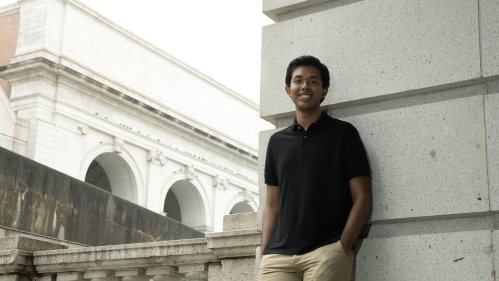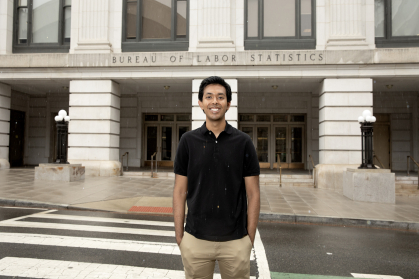
Scarlet Service Stories: Tejas Sinha
Tejas Sinha, Bureau of Labor Statistics in Washington, D.C.
To Tejas Sinha, economics isn’t just about money and wealth. It’s a way to understand and predict human behavior and find solutions to some of the world's toughest problems.
“It’s also a study of scarcity of resources and how people make decisions,” said Sinha, 21, a senior majoring in economics and math at Rutgers-New Brunswick. “If we don’t act quickly in the next few decades, we could run out of clean water and air. That’s why I think it’s important to understand how these systems work.”
His Scarlet Service internship at the Bureau of Labor Statistics in Washington, D.C., gave him the opportunity to conduct economic research, a career path he became interested in pursuing after reading Poor Economics, a book by Noble Prize-winning economists on tackling global poverty.
“The book showed me that research in economics doesn’t have to be purely theoretical,” said Sinha of Pennington, N.J. “It can also have a very direct, real-world impact and that’s something that’s really important to me in a career. My goal throughout college has always been to enter a career with social impact focusing on issues such as economic development and climate change.”

At the Bureau of Labor Statistics, he worked to support a machine-learning model the agency uses to turn survey responses into quantitative data. Sinha said the internship allowed him to work independently, and learn more about the use of artificial intelligence in economic data with an opportunity to present his findings at the end of his stay.
Since he’s been at Rutgers, Sinha has completed three other internships, but he said Scarlet Service was different for two reasons: He experienced working at a federal agency for the first time and had a chance to live in the nation’s capital. Sinha went to museums – his favorite subject in high school was history – and met his fellow Rutgers students from other academic circles.
Sinha will serve as the co-president of Rutgers Consulting Group, a club that connects students with businesses, government agencies, and non-profits to tackle projects. He plans to start Rutgers Economics Labs, a new student club designed to conduct economic research for government agencies and think tanks.
“I’m really grateful to have been given the opportunity to work on real-world challenges as a student and I want to pay that forward as a leader of these two clubs,” he said.